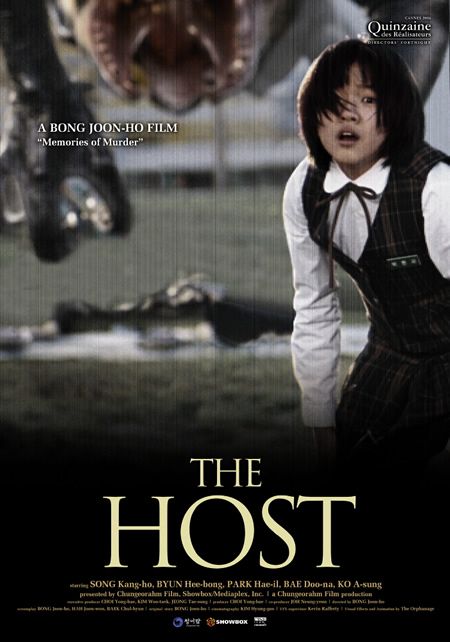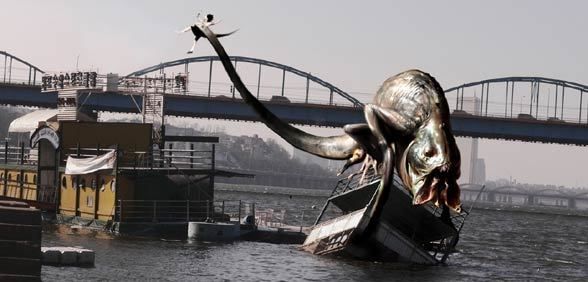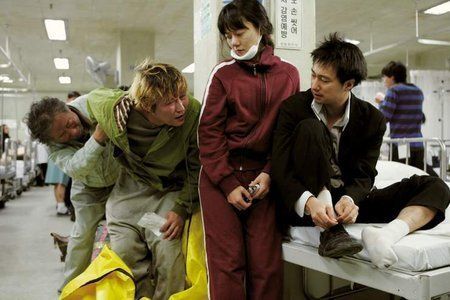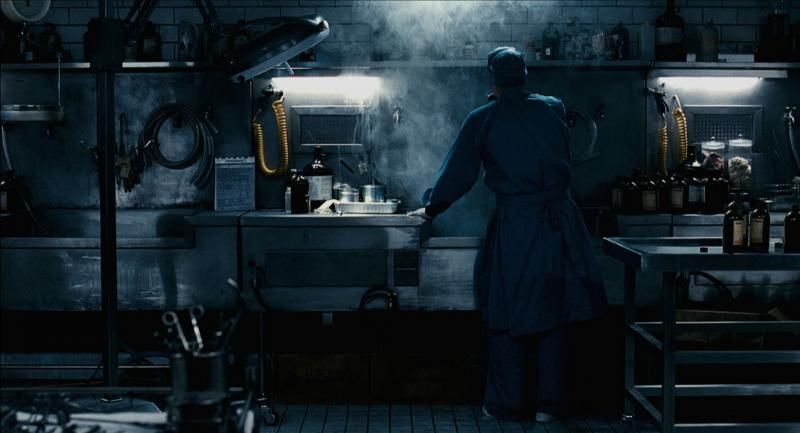The
Host (Gwoemul)
2006
Director: Bong Joon-hu
Starring: Song Kang-ho, Go Ah-sung,
Byeon Hee-bong
I
am continually wary of modern horror films, because modern horror films delight
in showing ridiculous amounts of gore.
You know; torture porn. And this
is not for me. Logically, I know they
are not all that way, but I’m not always logical, so I tend to steer clear as
much as possible from these films. But 1001
Movies can be a great motivator, so I finally said “okay” to The
Host, a modern Korean monster horror picture. That’s also a comedy. And a political satire. Amongst other things. And I quickly realized that The
Host is nothing like many other modern horror films.
The
story opens with what can only be described as a psychotic American military
doctor ordering his Korean assistant to pour hundreds of bottles of
formaldehyde down the drain to eventually empty into the Han River. Naturally, six years later, a horrifying
mutant monster emerges (keeping my mouth shut about the chemical reactivity and
mutagenic capacity of methanaldehyde here), but not before we are introduced to
Gang-du (Song), a slacker of a grownup who can barely keep his eyes open while
manning his father’s (Byeon) tiny convenience store. When the monster cuts a wide swath of
destruction, Gang-du tries to fight it off, but instead manages to lose his
only daughter, Hyun-seo (Go), to the monster in the process. Initially thinking her dead, Gang-du, his
father, and his brother and sister later believe that Hyun-seo is still alive
in the sewers, which prompts them to come together to fight off the monster and
the military, who fervently believe Gang-du has been infected with a
virus.
There
are several facets to The Host that make it palatable to
me, someone who actively tries to avoid this sort of monster horror film. The first one, and one that goes quite a long
way, is the broad streak of black comedy painted up and down and sideways
throughout The Host. I laughed, and
actually laughed out loud in the room by myself, several times. The yellow-clad government agent who makes
his entrance by falling down, the fact that the stupidly brave American is one
of the first to try to attack the monster (of course!), the unexpected dropping
of key objects at certain points, and probably my favorite funny moment, when
Hyun-seo’s family believes she’s dead.
Right there, that should not be funny.
A young child is believed dead by her relatives? Not funny.
But watch the four actors wail ridiculously and flop around on the
ground to such utter excess, I laughed out loud, and more than once. The Host is not comedy first, it
definitely primarily identifies as monster horror first and foremost, but it
keeps a tone of never being entirely serious that goes a long way to help me
keep it down.
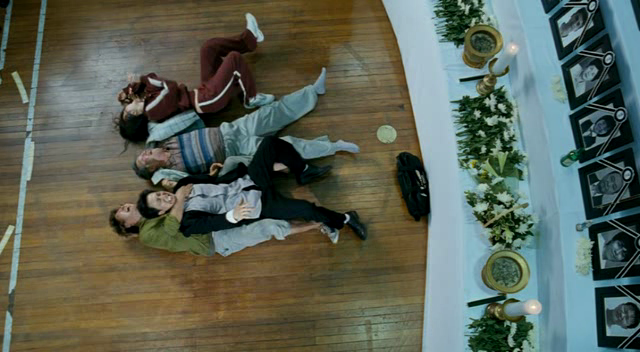 |
| This made me laugh. A lot. |
While
the comedy helps me make it through the film, what I respect most about The
Host is how it plays with preconceived film notions. First of all, in a monster horror film, one
does not have the monster attack in the first ten minutes. No, the first ten minutes are for
establishing “back story.” “Eff that,” The
Host says, “You’re going to have not just a monster attack, but an
extended and pretty significant monster attack really early on, and you’ll like
it.” What’s more, this attack takes
place in the middle of the afternoon on a beautiful sunlit day. This is so counterintuitive when it comes to
any kind of horror film, let alone monster horror, that it can’t help but be
refreshing. What’s more, The
Host really plays fully and freely with the concept of “movie
death.” We have been trained to
anticipate certain filmic cues as “that character just died,” when, in fact, we
have no actual confirmation of that. The
Host exploits this idea, convincing the audience on more than one
occasion that it just killed off a character, only to reveal, twenty minutes
later, that nope, you just made the wrong assumption. The effect this causes is two-fold; one, it keeps
you, the viewer, on your toes and much more actively engaged in the film when
you realize that “normal movie rules” no longer apply, and two, when a
character actually dies, it’s much more poignant. As a monster horror film, you expect
character deaths, accept them as a matter of course. But by bending the rules, The
Host manages to make those deaths much more meaningful.
The
Host also
has a very clear anti-government message in it.
The government’s handling of the monster attack is nothing short of
disastrous, with mixed messages and inadequate workers. Nothing from government officials actually
helps our band of heroes at all, and instead, very quickly, the government
becomes antagonistic. What’s worse, rather
than simply trying to get in our heroes’ way, the government starts talking
about “the virus.” Everyone must be
contained because of “the virus,” never mind the fact that no one has any
symptoms. There’s nothing like the mass
marketing of paranoia and fear to help out martial law. What’s more, the government fights the
monster by unleashing “Agent Orange,” biological warfare that winds up being
ineffective. As to which governments The
Host is unimpressed with, it is both its own (South Korea), but also
the US. Seen as both the perpetrator of
the original problem and also a major player in the mishandling of public
information, the US hardly gets a glowing recommendation in The
Host. As for myself, I saw in The
Host not a small amount of allegory to the US invasion of Iraq in 2002
and the nonexistent weapons of mass destruction. Again, not what I expected from a Korean
monster horror flick.
And
that’s really my biggest takeaway from The Host. It was not at all what I expected, and it
itself actively fights against your expectations as the story develops. With a focus far more on people than the
mutant monster, there is a lot going on here besides a simple horror story. I can’t say that I would ever want to watch The
Host again, because this is not my type of film, but I’m glad I saw it,
and I have a great deal of respect for it.
Arbitrary
Rating: 8/10
